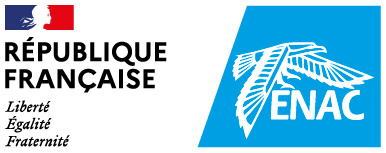A PhD at ENAC
To register as a PhD student at ENAC, one needs an MSc-level diploma and must moreover:
- Provide evidence of research experience (e.g., an end-of-study internship on a research-oriented subject together with the production of a scientific report).
- Select a scientific discipline (for example at ENAC, there is no “PhD in aviation”) among those of the three doctoral schools (or ED, for École Doctorale):
EDs are multi-university structures in charge of the scientific aspects of the PhD programme, each ED deals with a certain spectrum of scientific themes. The choice of the specific ED depends upon the subject of the envisaged thesis. - Find a thesis supervisor (DT, for Directrice/Directeur de Thèse) holding an HDR (Habilitation à Diriger des Recherches) among the professors of the three research teams (LII, OPTIM and TELECOM) of ENAC Research Lab (see: https://www.enac.fr/en/enac-lab-0) who agrees to advise/supervise you on a research subject that she/he will propose to you in her/his field of expertise. Typically, potentiel DT are looking for good candidates to work on one of their subjects.
- Find a funding source (the salary of the PhD student), commonly this is done with the help of the envisaged DT, for example within the framework of research projects carried out with industrial partners, with academics from another university, etc.
Then, the DT will guide you through the inscription process at the ED and at ENAC, and she/he will then come back to us.
What is a PhD?
A PhD is the highest internationally-recognized university degree (in France, beyond that there is the HDR, which must be held by the thesis supervisor).
The PhD is a study programme provided via research practice and with research as an objective. Its duration is three years, after obtaining a master's degree or an engineering diploma. This PhD programme includes personal research work carried out by the PhD student within a research unit associated with an ED, and is supplemented by additional training validated by the ED. The PhD candidate produces a thesis which is evaluated by two external referees who will allow its oral defence to be held in the presence of a larger defence committee.
The PhD certifies the ability to identify and solve complex and new problems involving a plurality of fields, using the most advanced knowledge and know-how, to design and manage research and innovation projects and processes. The PhD leads to the production of new knowledge via scientific publications recognized by peers in the discipline. The years spent in the PhD programme are recognized as professional experience.
Implementation of the PhD
The PhD can take place in a wide variety of regional, national or international, academic and industrial contexts. The PhD yields significant original scientific contributions, and it provides to the PhD student an international experience and a culture of innovation. Examples of different types of PhD include:
- “CIFRE” theses, which are carried out in close partnership with industry: the company hires the PhD student, provides the funding, and proposes the thesis subject.
- Theses carried out as part of research projects (for example associated to European projects), which allow PhD students to interact (through seminars, research stays) with academic or industrial partners, in France or abroad.
- Theses carried out under co-supervision with a foreign university make it possible for the PhD student to alternate research stays within the two research teams involved, and to obtain two doctoral diplomas (one awarded by ENAC and the University of Toulouse, the other by the foreign university).
Funding
There are different possible sources to fund a PhD thesis, among which:
- Public funding provided by the Ministry of Higher Education and Research. Such a funding is obtained following a selection process conducted by the EDs).
- Public-private funding obtained (see for instance the “CIFRE” theses mentioned above).
- Funding within the framework of research projects carried out by the ENAC research laboratory (for example ANR projects, European projects).
- Funding from the Occitanie region and the Université de Toulouse of which ENAC is a member.
To contact ENAC
To contact ENAC, please write to this email address:









